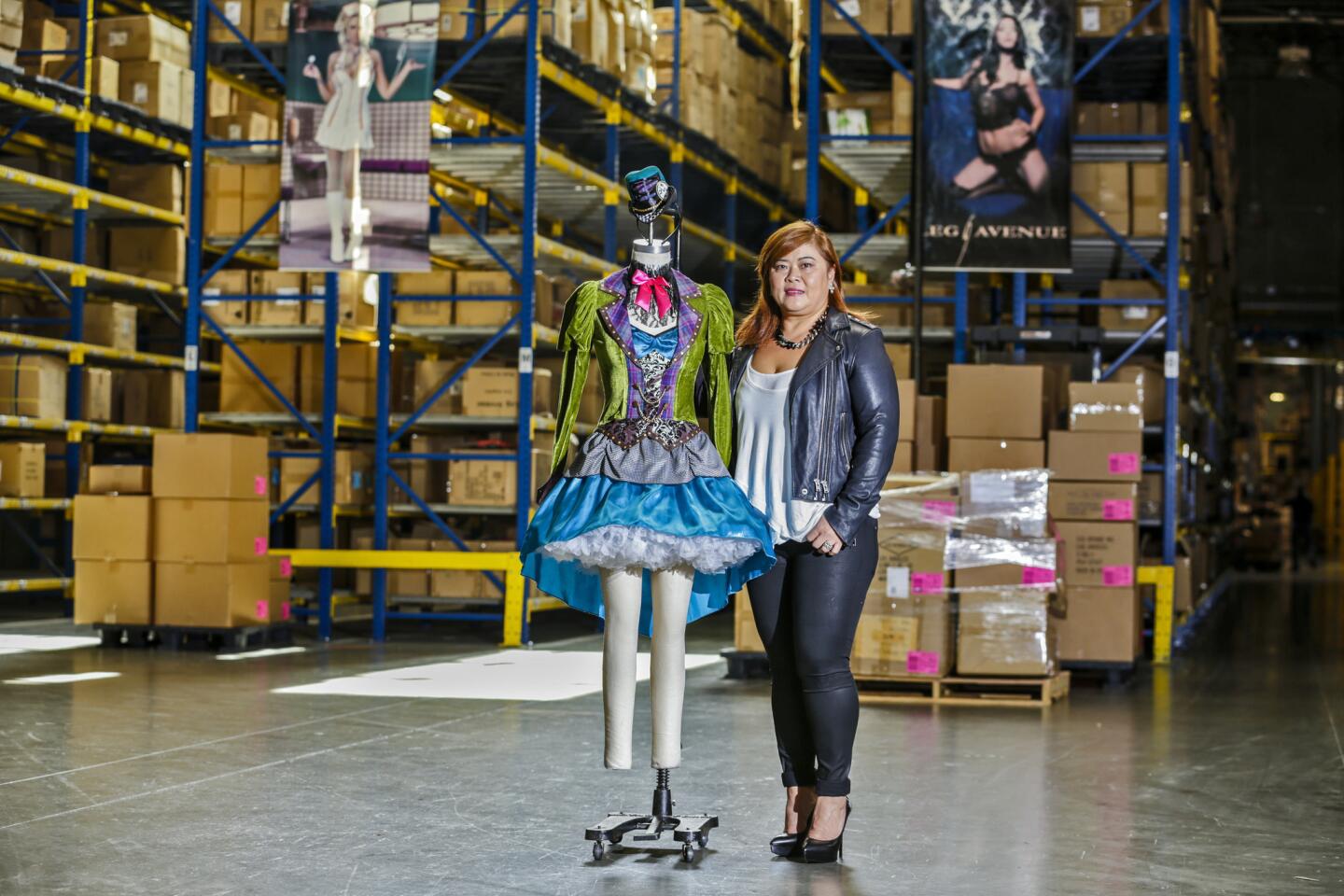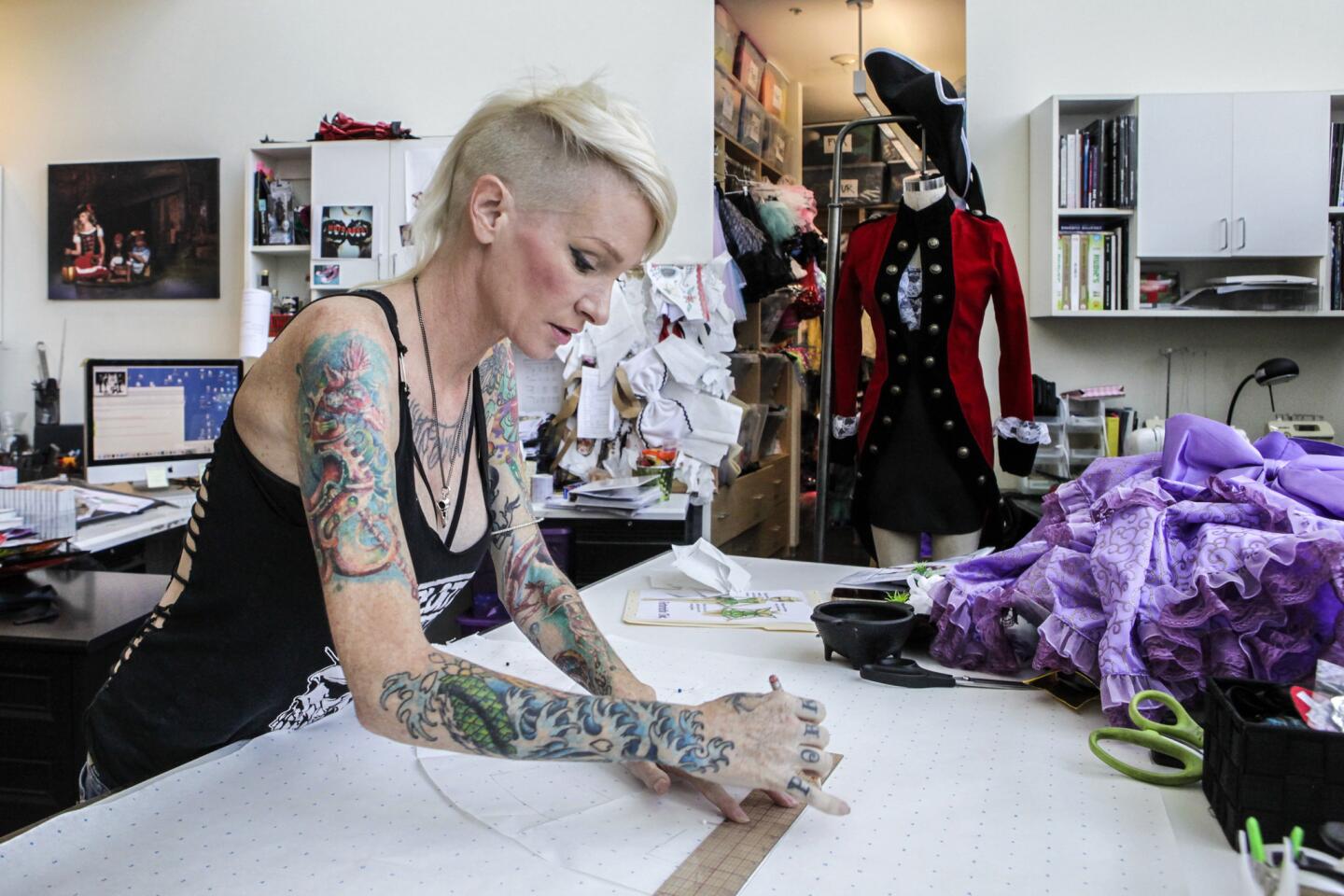Meet the company that helped make Halloween R-rated
The last thing Amy Tsai needs at this high-pressure moment is a Playboy-style bunny wearing a red plaid tuxedo.
A competitor’s catalog features one. Her company’s doesn’t.
“Our bunnies are going to get killed,” she mutters.
And that’s just one of the challenges stressing out Tsai as Halloween approached.
A rainbow-colored cat costume needs to come in under budget.
The stripes on another costume need to wrap around the torso.
As Tsai sits on a maroon couch, a designer holding two Snow White costumes approaches.
Tsai’s decision is quick.
“Go with the shorter one,” she says.
That might as well be the City of Industry-based company’s motto.
Go with the shorter one.
— Amy Tsai, Leg Avenue
It was going with shorter skirts that transformed Leg Avenue from a small company that made leggings and lingerie into a dominant force in the Halloween costume business.
“We brought the sexy in,” says Tsai, the company’s chief merchandising officer.
*
Tsai’s family never celebrated Halloween. They moved from Taiwan in 1984 and considered costumes a waste of money.
Tsai went trick-or-treating anyway. It appealed to her budding business sense.
“If you knock on the door, they have to give you candy,” she says. “Nobody ever said no.”
Tsai’s father started the family business because leggings and tights were easy to carry and didn’t cost much. Six days a week Tsai and her three siblings sold them at swap meets.
At USC, Tsai studied music and played French horn in the marching band. But she learned business and design in a wholesale clothing mart in downtown Los Angeles’ Toy District.
It was Tsai who gave the company its name, Leg Avenue.
“It’s like Saks Fifth Avenue but for legs — but just one leg, because my English was bad,” Tsai says.
She soon became the company’s designer, focusing on encyclopedic variety — every color she could think of, and glued-on bows and zippers and bits of lace.
The family elected Tsai its business representative while she was still in college. At a Halloween trade show in Chicago, a customer suggested the company get into costumes, and Tsai pitched her family the idea.
“We didn’t know very much about Halloween, but ... at these conventions, people took it all so seriously,” Tsai says.
The following year, 2000, Leg Avenue returned to the convention with a rudimentary, but revolutionary design: skimpy black lingerie with cat ears.
It was a good time for a lingerie company to get into costumes, says Marc Beige, chairman of the board of directors for the Halloween Industry Association.
A confluence of cultural and economic forces was sexualizing Halloween, turning it into an adult holiday.
Scares about razor blades in candy in the 1970s and 1980s put a damper on door-to-door trick-or-treating. People increasingly celebrated at parties, which led to a renaissance in the design and complexity of costumes, says Beige, who is also chief executive of a New York-based costume company.
By the time Leg Avenue entered the market, adult costumes made up nearly half of total sales, Beige says.
At the same time, attitudes toward sexuality were liberalizing across the nation, says Lisa Morton, author of “Trick of Treat: The History of Halloween.”
Movies were showing more nudity. Madonna wore corsets to nightclubs. “The idea that you could be sexy and feminist started showing up in Halloween costumes,” Morton says.
Halloween parades in New York, Los Angeles and San Francisco doubled as gay pride celebrations, offering a vision of the holiday as one raucous orgy.
In Los Angeles, the Playboy Mansion’s Halloween parties became popular with celebrities, and Playmates did their sexy costume shopping at a Leg Avenue retail client in Hollywood: Trashy Lingerie.
“Sexy Halloween really started in Southern California,” says Trashy’s vice president, Randy Shrier. “It’s the one holiday this city really gets behind.”
As the titillation trend grew, Tsai outsourced much of the company’s work to China and pushed the mass production of new designs: sexy bees, sexy referees, sexy ladybugs, sexy pirates.
College students’ lust for lascivious costumes accelerated sales, and Leg Avenue expanded to keep ahead of demand. The company’s catalog now includes more than 300 costumes — 100 designed fresh each year — in such categories as “Fairies and Bugs,” “Harlequins and Clowns,” “Warrior and Goddesses” and “Schoolgirls and Nerds.”
Tsai says that Nicki Minaj, Miley Cyrus and Lady Gaga have each worn Leg Avenue products at events and during photo shoots.
Like all trends, however, sexy Halloween styles are losing momentum. So Tsai and her designers pore over thumbnails of a newly licensed costume design: Hello Kitty.
Sanrio, the parent company, doesn’t want the icon to lose her innocence. “They’re looking for sweet, not edgy,” one designer says.
Another designer, meanwhile, has cooked up a new costume that, like sexy Cinderella or sexy Rear Admiral, might have perplexed a family of immigrant entrepreneurs just a few years ago.
It’s based on a video that went viral recently, of a rodent tenaciously dragging its dinner through a New York City subway stairwell: Pizza Rat.
ALSO:
Automakers struggle to bring affordable diesel cars to U.S. market
Investor Ackman defends Valeant in 4-hour conference call
Peet’s brews up another deal, takes majority stake in Intelligentsia
Twitter: @frankshyong
More to Read
Inside the business of entertainment
The Wide Shot brings you news, analysis and insights on everything from streaming wars to production — and what it all means for the future.
You may occasionally receive promotional content from the Los Angeles Times.















